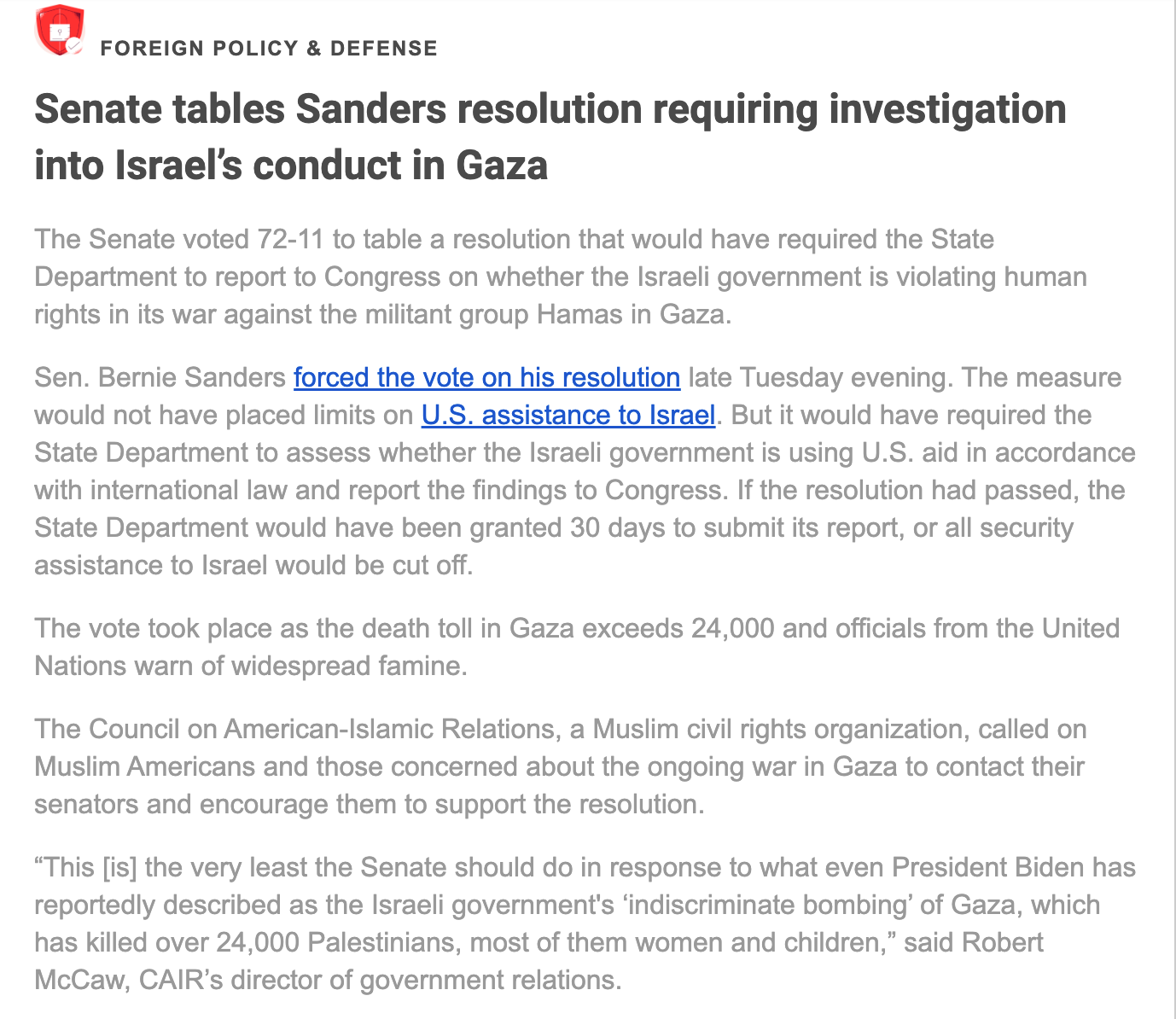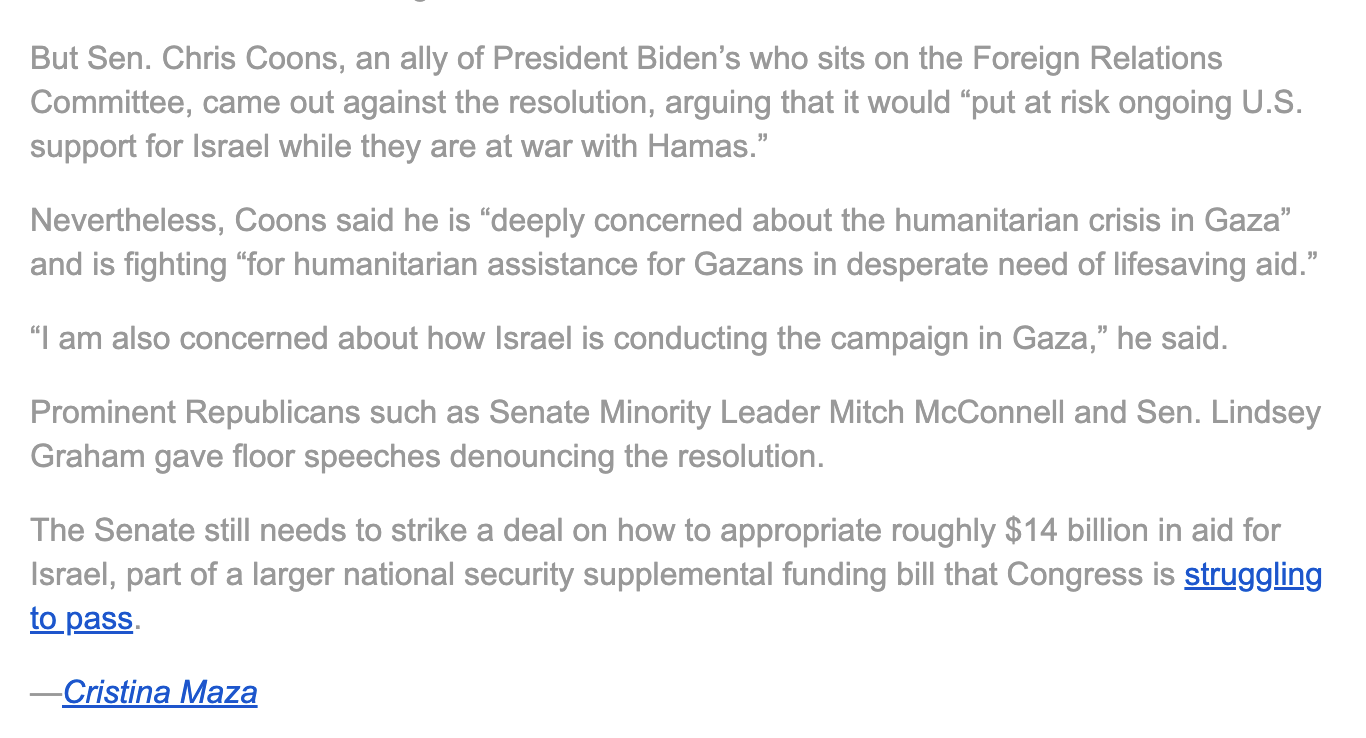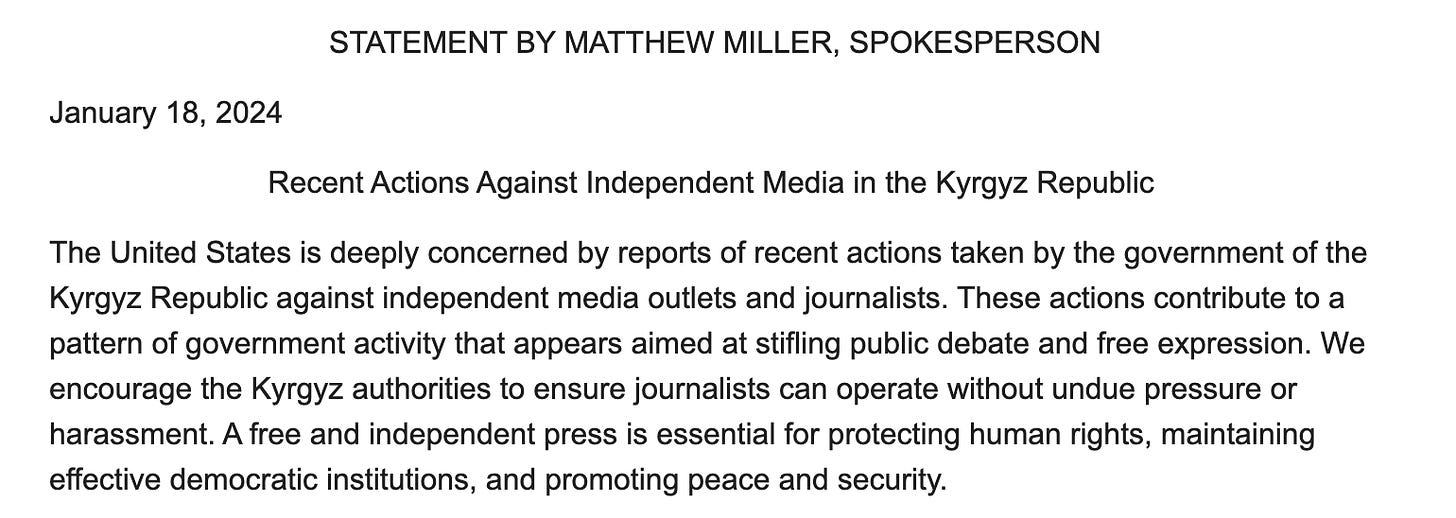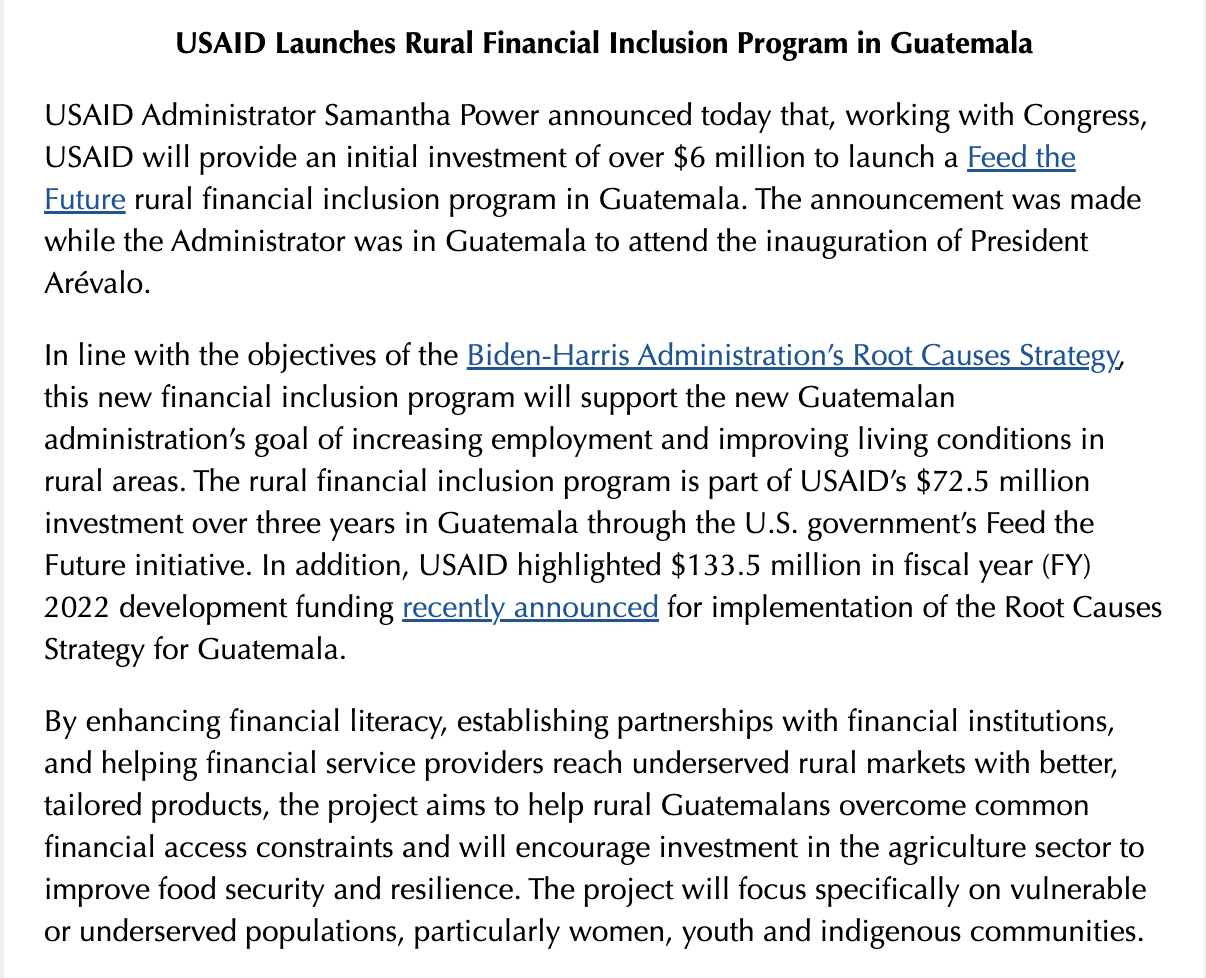I’m writing this message at almost 10:00 pm (22:00h) at the end of a grueling week that involved a lot of commuting between cities in freezing weather and penguin-stepping across frozen ground to press conferences and panel discussions. I had initially intended to write about Colombia. It’s Bogota’s turn, after all. I’ve also been hosting a friend’s cat for the last several weeks as she backpacks through the country and sends updates via WhatsApp, so I’ve been thinking about Colombia a little more than usual, too.
But something else was creeping through the back of my mind like sludge this evening that seemed more pressing, and that is the seemingly unrelated series of news stories from the Middle East that perhaps aren’t entirely disconnected after all. There were so many that didn’t fit neatly in the What I’m Reading section, but they were also too important to leave out.
On Thursday afternoon, Senate Foreign Relations Committee members received a classified briefing from Secretary of State Antony Blinken, who recently returned from the Middle East. The lawmakers leaving the meeting used words like “sobering.” Many expressed concerns that the war in Gaza would escalate into a larger regional war.
United Nations Secretary-General Antonio Guterres said this week that he is “extremely worried about Lebanon,” and “we cannot have in Lebanon another Gaza.” Everyone seems to be ringing alarm bells.
We’ve heard about the risks of a wider Middle East war since October. But the potential for something to kick off isn’t the same as it actually kicking off, and I’m starting to wonder if we’re already in the midst of something we can’t see clearly or fully understand yet. That’s why I decided to go back over my notes for the week and try to distill all that’s happening, because maybe laying it out clearly in words will give me the illusion of control.
Here’s a short list of stories that keep me up at night:
Iran hit the insurgent group Jaish al-Adli with airstrikes in Pakistan. Then Pakistan retaliated, carrying out airstrikes in Iran’s bordering province of Sistan-Baluchistan. The Pakistani army said it is in a “perpetual state of readiness” after it carried out the strikes in Iran. As CNN noted, “Both nations have long fought militants in the restive Baloch region along the border. But while the two countries share a common separatist enemy, it is highly unusual for either side to attack militants on each other’s soil.”
The Iran-aligned group Hezbollah in Lebanon rejected Washington’s proposals for de-escalating tensions with Israel, such as pulling its fighters from the border. But the group said it remains open to U.S. diplomacy to avoid a full-scale war. Meanwhile, the Israeli Defense Forces said they carried out a strike in the area of Ayta ash Shab in Lebanon.
The United States struck Houthi military sites in Yemen for the fourth time in a week. The Houthis said they will expand their targets in the Red Sea to include U.S. vessels.
Suspected Jordanian air strikes on southern Syria killed 10 people, including children, according to local Syrian media and the Syrian Observatory for Human Rights.
Iran’s Revolutionary Guards launched ballistic missiles at an alleged spy base for Israel’s intelligence agency Mossad in northern Iraq and at “anti-Iran terror groups” in Syria. Iraq recalled its ambassador from Tehran and summoned Iran’s chargé d’affaires in Baghdad in protest over the Iranian strike on northern Iraq that killed several civilians.
Many of these events are only loosely related at first glance. But when you add up airstrikes in Gaza, Iran, Lebanon, Pakistan, Iraq, Syria, and Yemen over the course of a week, with most of these strikes carried out by Iran, Israel, or the U.S., the picture looks rather ominous. Please feel free to write to me if you have anything to add about why we should or shouldn’t be worried about this confluence of events.
In the meantime, imagine me anxiously pouring over news and emails as I drink my morning coffee and stare out at the snow, blanketing the streets in a white dust that seems a little too idyllic, given everything.
What I’m writing:
• I spoke to Veronika Mudra – a Ukrainian asylee, women’s rights activist, and the founder and CEO of the anti-domestic-violence organization White Ribbon USA – about how her experience with domestic violence led her to advocate for significant policy reforms in Ukraine and around the world. This interview is unlocked and free to read.
• Congress still hasn’t passed more funding for Ukraine, and lawmakers are still negotiating new border security provisions in exchange for the aid. As lawmakers spent yet another week negotiating a border deal, I spoke to Senators about what new policies they really want and whether those policies would reduce border crossings as they hope. This story is unlocked and free to read.
My weekly news blurbs:
What I’m reading:

• The Diplomat has a fascinating story about the little-known transpacific slave trade and one of the first Asians in the Americas. She later became a spiritual icon.
• A cross-border team of journalists discovered 1,015 unmarked graves of migrants in 65 cemeteries buried over the last 10 years across Spain, Italy, Greece, Malta, Poland, Lithuania, France, and Croatia, according to the JournalismFund Europe.
• Security officials from 83 countries gathered in Davos to discuss Ukraine’s demands for ending the war with Russia, in talks marked by rising non-western participation but limited progress towards peace, the Financial Times reports.
• Switzerland agreed to host a global peace summit at the request of Ukrainian President Volodymyr Zelensky, Reuters reports.
• Budapest has signaled to the European Union that it is ready to lift its opposition to funding Ukraine ― as negotiations continue on sweeteners that would make it easier for Hungarian Prime Minister Viktor Orbán to climb down, Politico Europe reports.
• More than 20 leading European politicians are calling on European Commission President Ursula von der Leyen to launch an investigation into allegations of fraud in Srbia’s December election, Politico Europe reports.
• Brussels is looking at ways to unfreeze more than €100 billion in EU funding for Poland, even if President Andrzej Duda blocks Prime Minister Donald Tusk’s rule-of-law reforms, the Financial Times reports.
• Poland’s government said it would ignore a ruling by the country’s Constitutional Court that deemed illegal plans to overhaul state media outlets, Bloomberg reports. The Ministry of Culture said the verdict from the court was “not an independent and impartial” one and “has no legal significance whatsoever.”
• Polish MPs voted to revoke a far-right ultra-nationalist politician’s parliamentary immunity from prosecution after he doused candles lit in celebration of Hanukkah last month and called the Jewish festival “satanic,” the BBC reports.
• Poland’s anti-corruption bureau announced the arrest of former Deputy Foreign Minister Piotr Wawrzyk in connection with the country’s visas-for-cash scandal, the Financial Times reports.
• A top NATO military official called on the public and private sectors in the West to prepare for an era in which fighting a war could happen at any time, saying, “We need a warfighting transformation of NATO,” Reuters reports.
• Israel has withdrawn thousands of troops from Gaza following pressure from the United States to transition to a more surgical phase in the war, the Wall Street Journal reports.
• Top White House official Brett McGurk is quietly floating a controversial plan to reconstruct Gaza after Israel’s assault concludes, HuffPost learned, despite serious concerns from some inside the administration that it would sow the seeds for future instability.
• House Democrats have drafted a letter seeking the resignation of White House aide Brett McGurk, whose Middle East policies are seen as worsening the Gaza crisis, the Huffington Post reports.
• Saudi Arabia’s foreign minister said his country could recognize Israel if a comprehensive agreement was reached that included statehood for Palestinians, Reuters reports.
• Israeli Prime Minister Benjamin Netanyahu rebuffed U.S. calls for a post-war peace process that would lead to Palestinian statehood, the New York Times reports.
• A senior United Nations official warned that the humanitarian crisis in Gaza was hurtling toward famine, the New York Times reports.
• The United Kingdom will ban the Hizb ut-Tahri Islamist group as a terrorist organization after followers allegedly chanted “jihad” at a pro-Gaza rally praising the Oct. 7 Hamas attacks, the BBC reports. British Home Secretary James Cleverly said the group is “antisemitic” and “actively promotes and encourages terrorism.” The group said it “completely refutes that it is antisemitic or encourages terrorism” and would challenge the proposed ban “using all available legal means.”
• Iraqi Prime Minister Mohammed al-Sudani said the U.S.-led coalition that assisted his country fight the Islamic State militant group is no longer needed, adding, “We believe the justifications for the international coalition have ended,” the Wall Street Journal. The Pentagon declined to comment, adding that the Iraqi government has not made any official requests for U.S. forces to vacate.
• The United States condemned Iran over attacks in Iraqi Kurdistan and Syria, calling them “reckless and imprecise,” the BBC reports. Iran’s Revolution Guards said they struck Israeli “spy headquarters” in the region.
• North Korean leader Kim Jong Un said his country would no longer pursue reconciliation with South Korea and called for rewriting the North’s constitution to eliminate the idea of shared statehood between the war-divided countries, NBC News reports.
• North Korean leader Kim Jong Un called for the constitution to be changed to ensure South Korea is viewed as the “primary foe and invariable principal enemy,” Reuters reports.
• North Korea scrapped several government bodies tasked with promoting reconciliation and reunification with South Korea, Al Jazeera reports.
• Somalia’s foreign ministry said there is “no room for mediation” with Ethiopia unless it retracts its “illegal” deal with the self-declared Republic of Somaliland that allows for the lease of its coastline.
Interesting statements:
You can write to me for any reason: c.maza@protonmail.com









